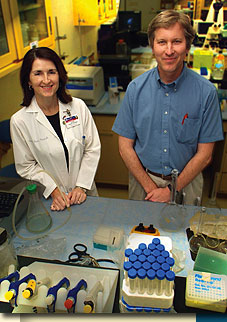Recycling an old antibiotic
to help stroke victims
An old intravenous antibiotic may have new life as a stroke treatment, according to a team of researchers from the Medical College of Georgia and the University of Georgia. They are studying minocycline, a broad-spectrum antibiotic, in a $1.8-million clinical trial funded by the National Institute of Neurological Disorders and Stroke.
David Hess (above right), chair of MCG’s Department of Neurology, and Susan C. Fagan (above left), UGA professor of pharmacy, are leading a team of researchers in a study of minocycline in 60 stroke patients in Georgia, Kentucky, and Oregon.
 “We know it’s safe in humans and we know that the concentrations we need to see improvement in the brains of rats can be achieved safely in humans,” said Fagan, who also serves as assistant dean for the MCG program in the UGA College of Pharmacy and was a co-investigator in the studies that led to minocycline’s use in rheumatoid arthritis.
“We know it’s safe in humans and we know that the concentrations we need to see improvement in the brains of rats can be achieved safely in humans,” said Fagan, who also serves as assistant dean for the MCG program in the UGA College of Pharmacy and was a co-investigator in the studies that led to minocycline’s use in rheumatoid arthritis.
The team’s animal studies have shown that the drug, given within six hours of a stroke and then every 12 hours for up to three days—the peak time of inflammation—reduces stroke damage by up to 40 percent. In humans, the researchers said they believe the antibiotic will be an effective adjunct therapy for tPA, short for tissue plasminogen activator, the only FDA-approved clot-busting drug therapy for stroke patients.
“Minocycline is a safe drug that is easy to give and tolerate,” Hess said. “It gets into the brain well and may reduce bleeding—the primary side effect of tPA. We think it will make strokes smaller and patient outcomes better.”
The drug’s safety and optimal stroke dose are the focus of the phase-one clinical trial in patients at the MCG, University of Kentucky, and Oregon Health & Science University. The researchers will fine-tune the dose by looking in the blood for certain biomarkers that indicate inflammation, and they will explore the possible benefits of administering the drug for longer than three days.
One way in which minocycline fights inflammation is by inhibiting microglial cells, white blood cells that are activated by a stroke, said Hess. “When activated, they get ‘angry’ and produce materials that damage the brain.”
Minocycline also blocks matrix metallo-proteinases, enzymes released during a stroke that destroy the basement membrane of blood vessels. And minocycline also works by blocking apoptosis, or cell suicide, an observation originally made by MCG cell biologist Zheng Dong. “It does this by increasing a protein called bcl-2, which helps cells survive,” Hess said.
The antibiotic’s potential usefulness in protecting brain cells began surfacing in scientific literature over the past few years. “It was so interesting to us because we knew the limitation of other drugs was that they didn’t cross into the brain,” Fagan said. “We knew that minocycline did, based on previous experiments—and the fact that many people who take it for acne or rheumatoid arthritis get dizzy.
“We wanted something we could give at least three hours after stroke or later. In our work in animal models, we found that at delayed time intervals it was profoundly neuroprotective. We studied it at multiple time points at multiple doses and, in fact, some of the most important work we did was finding out how the rodent dose could be translated to humans,” she said, referencing work published in Experimental Neurology in 2004.
At MCG, Hess and fellow neurologists Chris Hall, Fenwick Nichols, and Jeff Switzer are enrolling patients in the study. Other MCG contributors include biostatistician Jennifer Waller and physiologist Adviye Ergul.
For more information contact Mary Anne Park, study coordinator, at: mpark@mcg
 |

